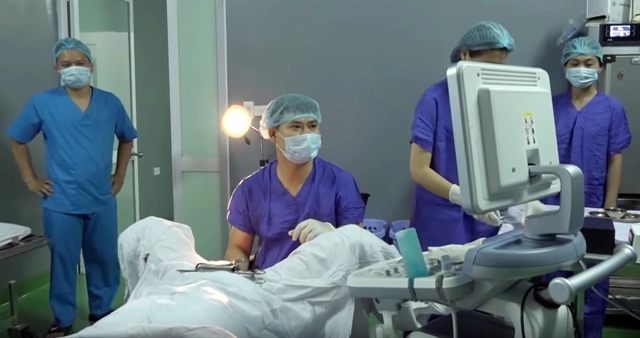 Society
Society

 |
| Doctors implement reproductive techniques at the National Hospital of Obstetrics and Gynecology in Hà Nội. — Photo suckhoedoisong.vn |
HƯNG YÊN — Thanks to the combination of Preimplantation Genetic Testing (PGT) and In Vitro Fertilisation (IVF) technology, many couples carrying genetic diseases can now give birth to healthy babies.
Seeing their second child confidently taking steps, Lê Thị Nguyên and Hoàng Đức Lân, a couple from the northern province of Hưng Yên, couldn't express enough joy as their child was free from Duchenne muscular dystrophy.
Duchenne muscular dystrophy is a genetic condition that gradually weakens children’s muscles, impairing their movement and daily functions. Over time, affected children lose their ability to walk, sit upright, and even stand. In severe cases, it can also impact the respiratory muscles necessary for breathing.
In 2011, Nguyên gave birth to their first son. At birth, the child was as healthy as any other, but it wasn't until around 17 months old that he started to walk.
In 2015, when their son was four years old, the couple began to worry when they noticed he had difficulty walking, especially when climbing stairs or would fall frequently. They initially thought it was due to malnutrition, so they bought supplements for him to take, but his condition didn't improve.
"We were very worried and took our son to the National Children's Hospital for examination," Nguyên said.
"After genetic tests, the doctor concluded that our son had Duchenne muscular dystrophy. That meant his muscles would gradually weaken. What's concerning is that there is currently no cure for the disease, and it could even affect his lifespan.
"Upon hearing this, it felt like my ears were ringing. I couldn't believe it because throughout my pregnancy, I was perfectly healthy, and our son was born normally and healthy."
Refusing to accept the truth, the couple took their son to other hospitals, but all returned with the same diagnosis. Their son had a single-gene disorder, Duchenne muscular dystrophy, caused by a mutation occurring on the X chromosome.
The couple decided to undergo further testing, which revealed that the wife carried the disease gene but in a recessive form.
The doctor advised them that if they wished to have more children in the future, they should consider undergoing IVF combined with embryo screening to eliminate embryos carrying the disease gene. This would increase the chance of having healthy babies.
Feeling disheartened and burdened with caring for their progressively weakening child, Nguyên and Lân avoided thinking about having another child for many years. However, deep within, Nguyên always harboured a desire to have a healthy child.
After enduring years of hardship and fervently hoping for a child, by the end of 2021, the couple made a final decision to pool all their resources and travelled to Hà Nội to explore the possibility of having another healthy child.
Upon arriving at the National Hospital of Obstetrics and Gynecology in Hà Nội, they received thorough consultations and decided to undergo In Vitro Fertilisation (IVF) at the hospital.
Fortunately, their visit coincided with the hospital's Golden Week event, a charity programme that helps low-income people with infertile issues to get IVF for free.
The couple received a free package for embryo screening. With this financial burden lifted, they gained hope for a positive outcome in their journey to have a child.
Following consultations, examinations and in-depth genetic testing, the couple embarked on the process of ovarian stimulation, embryo creation and embryo cultivation. Subsequently, these embryos underwent screening to eliminate those carrying abnormal genes before being transferred into the mother's uterus.
Luckily, the first embryo transfer was successful. As hoped, Nguyên's pregnancy progressed smoothly.
By January 2023, the baby was born completely healthy to the boundless happiness of the couple.
"Despite all the difficulties, my husband and I chose to move forward. We believed in modern medicine, and finally, our dream of holding a completely healthy baby in our arms came true," Nguyên said.
Not only Lân and Nguyên, but many couples have overcome the fear of genetic diseases to give birth to healthy children thanks to advanced reproductive technologies.
Dr Nguyễn Thành Trung, Head of the Medical Examination Department at the National Hospital of Obstetrics and Gynecology stated that the combination of IVF and preimplantation genetic testing is an effective treatment solution that brings boundless happiness to couples carrying genetic diseases such as thalassemia, hemophilia, muscular dystrophy, renal polycystic disease and congenital adrenal hyperplasia.
The support provided by reproductive technology packages has helped many couples burdened with rare genetic diseases to alleviate financial stress and increase the chances of having healthy babies, he said.
Trung said among genetic diseases, Duchenne muscular dystrophy is one linked to the recessive sex, with a high frequency among genetic diseases in the muscular dystrophy group.
Individuals with a family history of the disease should visit specialised hospitals for genetic counselling, examinations, and complete genetic testing before undergoing IVF combined with preimplantation genetic testing to facilitate the smoothest possible childbirth, he stressed. — VNS




